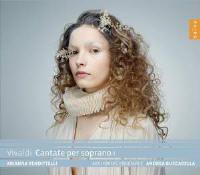Texte paru dans: / Appeared in: |
|
|
Outil de traduction (Très approximatif) |
|
|
Reviewer:
Bertil van Boer
The prolific Antonio Vivaldi probably wrote more music in every genre than almost anyone during his lifetime, with some exceptions like Georg Philipp Telemann or some of his German colleagues. This disc continues the complete music of Vivaldi, being Volume 68 of the Vivaldi Edition (they are listed in the order they appear on the disc in the headnote). As chamber cantatas were in vogue for the salons of the period, it is not surprising that Vivaldi indulged in composing them. Here we have six works in the more or less standard format of pairs of recitatives and arias to texts about pastoral love, a popular theme for these cantatas. As the genre was beginning to go out of fashion, that he didn’t write as many as, say, Alessandro Scarlatti, should not be surprising. But he nonetheless found opportunity to compose a number of them, about 30 in all, somewhere in the second decade of the 18th century. The six here probably date from around the time when Vivaldi was in Mantua, but he may have a couple for later performance. As the notes state, at least one (Sorge vermiglia) comes from a Dresden source of the 1730s, though the style to my mind reflects his earlier cantatas from Mantua. In 1722 he moved to Rome, and here the secular chamber cantata was still practiced in places such as the Arcadian Society, and so perhaps it might be speculated that he composed a number of these in anticipation of his career there. In any case, about this time he formed an “attachment” to soprano Anna Girò, who moved in with Vivaldi with her sister Paolina. One does not know the details of this arrangement, but her voice certainly served as the composer’s muse, for much of his work for solo soprano may have been written with her in mind, including these cantatas. It is clear here that the composer was interested in the relationship between Affekt, text, and music, writing miniature scenes that focus on the singer. For example, in La farfaletta s’aggira al lume the opening short aria describes the flitting about of a moth towards the light. Here the vocal line runs and swoops about above a similarly rushing continuo line. One can hear the fluttering of the wings. The second aria contrasts darkness and light, but the mood is soft and reflective, with a languid melodic line. Given that this reverses the normal order of slow at the beginning and faster in the final aria, the effect is quite dramatic. In Aure, voi più non siete there is an opening recitative that is slightly mournful, speaking of the dying of wind and sheltering trees in an insistent, yet gripping manner. The first aria, “Ti confide il piano mio,” meanders about in a solemn descending melody above a gnarly harmonic bass. Here we are firmly in the world of Baroque opera with a poignant lament. The final aria, “Le fiorite e belle sponde,” has an insistent bass line above which the soprano wanders with some equal insistence and drama, evoking a stream that brings no solace, only temporary relief. Again, Vivaldi has understood the dramatic core of the text here. Finally, in Si levi dal pensier the thoughts of rejection take on the form of a mocking theme in the first aria. In “driving the thoughts of deceit” the line keeps pushing the phrases along with some fluid ostinatos. Here the bassoon provides a nice accompaniment, scathing and satirical. The final aria, “Vanne sull’Adria infido,” gives the faithless lover the push to leave with imperious tones. The music is quite dramatic, as noted, in a more compact way. Vivaldi does know how to support but not paint his text with evocative lines and some nicely advanced harmony, not to mention passages of formidable coloratura. The latter is never over the top, as this is chamber music, but it is not amateurishly simple, either. One might expect these to be done with a variety of emotions by the singer. It requires a pure voice, with lots of depth and precision, yet soft and flexible enough to convey the emotions. Arianna Vendittelli only occasionally manages this flexibility. In many instances, she is quite shrill, and this has the effect of sometimes causing some intonation muddiness, not to mention biting timbres and sudden unexpected vocal expostulations. As a result, there is a certain static quality to her singing, though on occasion she is able to be more dramatic in an appropriate way. The continuo playing of the Abchordis Ensemble under Andrea Buccarella is, on the other hand, quite lively, energetic, and clear. To my mind, this is not the best disc of the edition, but it may be perhaps the only way these cantatas can be heard. If you are collecting the edition, this will be one more disc to add to the inventory, but I might prefer to wait for a second rendition. |
|




